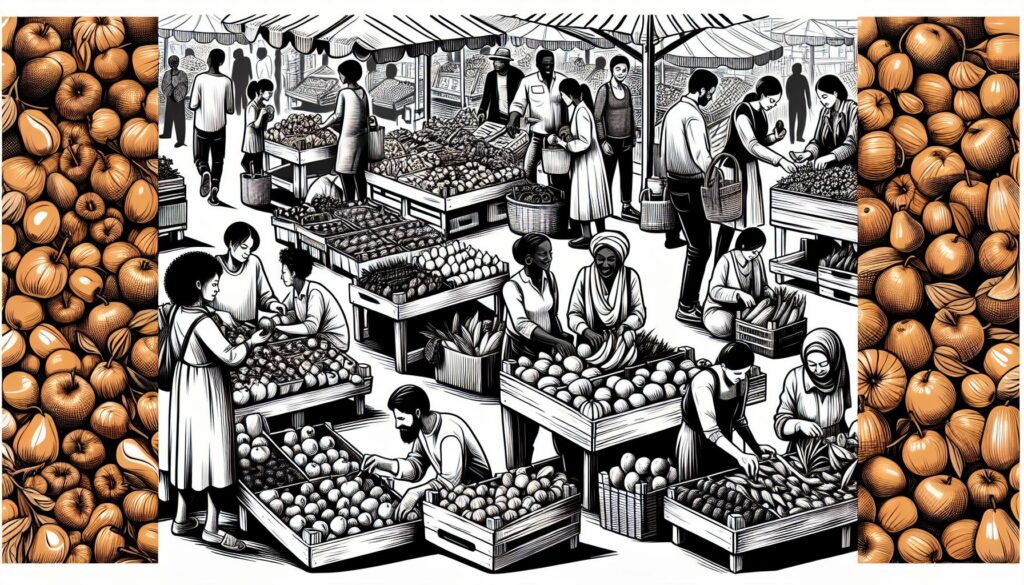Are you looking to make more sustainable food choices? Let me tell you about the game-changer: local farmers’ markets. These vibrant hubs offer a direct connection to fresh, seasonal produce right from the source.
I’ll show you how shopping at farmers’ markets not only benefits your health but also supports the local economy and reduces your carbon footprint. Get ready to discover the key to sustainable eating right in your community.
Benefits of Shopping at Local Farmers’ Markets
Shopping at local farmers’ markets offers numerous advantages for both consumers and the environment. Here are some key benefits:
- Fresh produce: When I shop at local farmers’ markets, I get access to fresh, seasonal produce that is often harvested just hours before being sold. This means I’m getting fruits and vegetables at their peak in terms of flavor and nutritional value.
- Supporting local farmers: By buying directly from local farmers, I ensure that they receive fair prices for their products, cutting out the middleman. This direct support helps to sustain local agriculture and family farms in my community.
- Reduced carbon footprint: When I purchase food from local farmers’ markets, I reduce the distance that my food travels from farm to table. This means less transportation and lower emissions, contributing to a more sustainable food system.
- Variety and uniqueness: Farmers’ markets often offer a wide variety of unique produce that may not be available in traditional grocery stores. I enjoy discovering new types of fruits, vegetables, and artisanal products that add excitement to my meals.
- Community connections: Shopping at local farmers’ markets allows me to build connections with the people who grow my food. I can ask farmers about their farming practices, learn about different varieties, and gain a deeper appreciation for where my food comes from.
- Educational opportunities: Farmers’ markets provide a great opportunity for me to learn more about seasonal eating, sustainable agriculture, and the benefits of supporting local food systems. I often come away from the market with new knowledge and inspiration for my meals.
- Economic impact: Supporting local farmers’ markets contributes to the local economy by keeping money circulating within the community. This helps to create a stronger economic base and supports small businesses in the area.
| Key Benefits of Shopping at Local Farmers’ Markets |
|---|
| Fresh produce: access to seasonal and nutritional food |
| Supporting local farmers: fair prices and sustainability |
| Reduced carbon footprint: lower emissions from shorter distances |
| Variety and uniqueness: discovering new produce |
| Community connections: building relationships with farmers |
This table summarizes the key benefits of shopping at local farmers’ markets.
Access to Fresh, Seasonal Produce
When it comes to sustainable eating, one of the key advantages of shopping at local farmers’ markets is the unparalleled access to fresh, seasonal produce. I love knowing that the fruits and vegetables I purchase are harvested at the peak of their ripeness, ensuring optimal flavor and nutrient content.
Freshness is paramount in the quality of the food we consume, and by buying directly from local farmers, I can truly taste the difference. Whether it’s crisp apples in the fall, juicy strawberries in the spring, or vibrant tomatoes in the summer, farmers’ markets offer a wide array of seasonal delights that cater to every palate.
Furthermore, by choosing to support local farmers, I not only enjoy foods that are at their flavorful best, but I also reduce the environmental impact associated with long-distance transportation. This means lower carbon emissions and a healthier planet, all while savoring the bounties of each season.
In essence, shopping at local farmers’ markets isn’t just about the food itself – it’s a sustainable choice that promotes freshness, supports local agriculture, and allows me to connect with the seasons in a tangible and delicious way.
Supporting the Local Economy
When I choose to shop at local farmers’ markets, I’m not just making a personal decision; I’m contributing to the health of my local economy. Did you know that for every dollar spent at a local farmers’ market, a significant portion stays within the community? This means that my support directly impacts the livelihoods of local farmers and their families.
By buying directly from these farmers, I’m cutting out the middleman and ensuring that they receive fair compensation for their hard work. Studies have shown that small-scale farmers receive a higher percentage of the retail price when selling their produce at farmers’ markets compared to selling through large retailers.
Furthermore, the money I spend at farmers’ markets doesn’t just benefit the farmers themselves. It ripples through the community, supporting other local businesses like bakeries, artisans, and food producers who often sell their goods alongside the fresh produce. This creates a multiplier effect that boosts the local economy and fosters a sense of community pride and resilience.
In essence, by choosing to shop at local farmers’ markets, I’m not only nourishing myself with fresh, seasonal produce but also nourishing the economic vitality of my community. It’s a simple yet powerful way to make a positive impact right in my own backyard.
Reducing Your Carbon Footprint
When it comes to sustainable eating, shopping at local farmers’ markets plays a crucial role in reducing carbon emissions. By purchasing food from nearby farmers, you support local agriculture and reduce the carbon footprint associated with transporting goods over long distances.
Here are a few key points to consider:
- Locally grown food travels shorter distances to reach your plate, resulting in lower emissions from transportation.
- Small-scale farms at local markets often use sustainable farming practices that are less damaging to the environment.
- By buying seasonal produce from farmers’ markets, you reduce the demand for energy-intensive greenhouse production and long-distance transportation of out-of-season fruits and vegetables.
Making a conscious effort to choose locally sourced and seasonal foods at farmers’ markets is a simple yet impactful way to reduce your carbon footprint and contribute to a more sustainable food system.
Enhancing Community Connections
When I think about local farmers’ markets, one of the first things that come to mind is the sense of community they foster. Studies have shown that shopping at these markets not only supports local farmers but also strengthens community ties. Here are a few ways in which local farmers’ markets help enhance community connections:
- Meeting Local Producers: At farmers’ markets, I have the opportunity to meet the people behind the produce. It’s a chance to chat with farmers, artisans, and vendors, learning about their products and practices. This direct interaction creates a sense of trust and connection that is often missing in traditional supermarket settings.
- Supporting Local Economy: By buying from local farmers, I contribute to the local economy and support small businesses in my community. This economic support helps in maintaining the vitality of the neighborhood and creates a circle of support that benefits everyone involved.
- Community Gathering: Farmers’ markets serve as more than just a place to buy food; they are also hubs for community gatherings. I enjoy strolling through the market, meeting neighbors, and socializing with like-minded individuals who share a passion for fresh, local foods.
- Educational Opportunities: Many farmers’ markets offer educational workshops, cooking demonstrations, and other events that help consumers learn more about the food they eat and the people who produce it. These events not only educate but also bring people together in a shared space.
By engaging with local farmers’ markets, I not only support sustainable eating practices but also cultivate a sense of belonging and connection within my community.
Key Takeaways
- Fresh produce at local farmers’ markets is harvested just hours before sale, ensuring peak flavor and nutrition.
- Buying directly from local farmers supports fair prices and sustainability of local agriculture.
- Shopping at local farmers’ markets reduces carbon footprint by decreasing food transportation distance.
- Farmers’ markets offer unique produce, build community connections, and provide educational opportunities.
Conclusion
Local farmers’ markets play a crucial role in promoting sustainable eating practices. By supporting local farmers, fostering community connections, and providing educational opportunities, these markets contribute to a more sustainable food system. Shopping at farmers’ markets not only benefits individuals by offering fresh, locally sourced produce but also strengthens the bond within communities. Embracing the concept of sustainable eating through local farmers’ markets is a step towards creating a healthier and more connected society.



